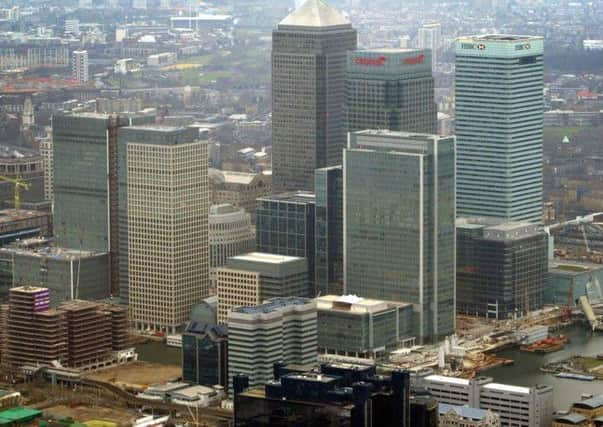Yes vote fears takes toll on financial markets


For those in the UK’s financial nerve centre the prospect of independence hasn’t been a risk worth considering, because as far as they have been concerned there’s been little chance of it happening.
Until last week. And as markets have begun to react to data suggesting a knife-edge verdict we’ve been given a timely insight into the potential fallout if Scotland votes Yes on the 18th – because there will be a reaction and to pretend otherwise is naive. For investors, whether in Scotland or elsewhere, independence is a risk to be factored in and weighed up like any other.
Advertisement
Hide AdAdvertisement
Hide AdThe polls pointing to a Yes surge triggered a reaction in currency markets, as investors sought to hedge against a sterling swing. More pertinently, for millions of ordinary savers and pension investors, it also prompted a modest sell-off in Scottish firms including Lloyds Banking Group, RBS and Scottish & Southern Energy.
The City’s biggest fears surround currency, but it’s far from the only issue exercising the minds of investors. Markets will also be unsettled by a Yes vote simply because they don’t like uncertainty. That may manifest itself in a hit to the share price of any business that derives large chunks of its earnings from Scotland, not least those in the financial services industry.
Firms in that sector may also suffer due to fears and speculation over the regulatory impact, justifiably or otherwise. There’s an argument to suggest that as Scotland diverges from rUK in regulation and Scottish-based companies are forced to develop a new set of processes there will be greater costs to bear for consumers of financial services north of the Border.
This is just the tip of the iceberg, without even considering issues such as tax receipts, oil, borrowing costs and EU membership. If this sounds excessively negative, that’s deliberate. There’s clearly a far more positive slant to put on the financial implications of independence, but that’s not how investors are likely to view it and markets aren’t known for being rational.
This isn’t about the arguments for and against independence. It’s about events and markets and recognising that if Scotland votes Yes there will be a reaction, both to the short-term uncertainty and to the potential long-term implications of independence.
It shouldn’t influence how anyone votes, not least because a close No verdict could equally create its own uncertainty by making another referendum all but inevitable further down the road.
Either way, however, the events of the past week have reminded us that a vote to end the Union will cause a financial fallout far beyond Scotland. Brokers and advisers are braced for pandemonium in the days after the referendum if Scotland decides to go for it.